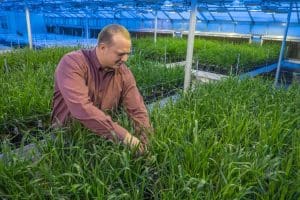MI Wheat Month
In July 2022, Governor Gretchen Whitmer proclaimed July as Wheat Month in Michigan in recognition of the importance of the wheat crop to Michigan’s economy. Annually, 40 million bushels of wheat are grown on more than 500,000 acres of Michigan farmland representing $281 million in economic impact for the state.
Dr. Eric Olson, the Director of the MSU Wheat Breeding and Genetics Program, focuses on the development of red and white soft winter wheat. Julia Miller, AgBio technology manager of Dr. Olson, explains the importance of his research. “The term ‘soft’ refers to the low gluten content in the resulting flour, meaning that the flour can be used for cakes, pastries, and other products that require low gluten content. This is a large industry for Michigan”.
Red and white soft winter wheat is planted in the winter and then harvested the following late summer or early fall. These strains specifically have better agronomic traits and disease resistance, to disease such as wheat rust. Julia states, “The state of Michigan is unique because we grow a lot of soft white winter wheat. Dr. Olsen’s program is important because there is a lack of people who breed soft white winter wheat. He breeds in Michigan, tests in Michigan, for Michigan farmers”.
Field trials in Michigan and the Midwest analyze these stains’ traits to ensure quality flour that is suitable for cake, cracker, and pastry production. Julia adds, “If you ever look at a Triscuit box it specifically says, white winter wheat grown in Michigan”. Dr. Olson has greatly expanded his research efforts for new soft winter wheat varieties that are suited for production regionally. “This program performs analysis using molecular marker data that can quickly identify varieties that are resistant to major wheat diseases of the region,” Julia adds.

